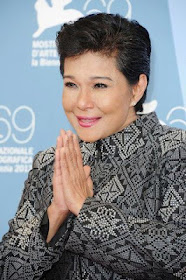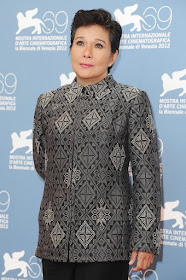By Tito Genova
Valiente
WEDNESDAY, 12 SEPTEMBER 2012 / REELING
----------o0o----------
THOSE who love Nora
Aunor’s art are speaking in tongues now. It is Babel in Nora fandom as fans
scramble to translate the words of European film critics from Italian, Spanish,
French, and German, all praising the actor’s performance and the film where
that magic occurred, Brillante Mendoza’s Thy Womb(Sinapupunan in
Pilipino).
Called the “wild
card,” the film has driven critics wild. Film readers talk of the sea, the
water as metaphor in a film that is about infertility and love. The vast
expanse of the sea in that part of Mindanao is glorified as a setting for a
tale that is a wondrously political commentary in the guise of a folk tale
about devotion and sacrifice. People in Europe are suddenly aware of
the southern Philippine territories. It is a gripping coincidence that
Mendoza’s other film, Captive, which is also about the South but this time
about kidnapping, is having commercial theatrical run. Venice talks of
Sitangkai and Tawi-tawi as geographical points validated by the romance of Mendoza’s
imagination.
It is perhaps odd
to call Nora Aunor the “wild card” of an actor but if we are going to reckon
the outpouring of grand reviews and tremblingly passionate and positive words
defining the greatness of the performance of Nora from the oldest film festival
in the world, then we might as well call Aunor the wild actor. Wild in the
sense of untamed, ferocious, fierce.
Revel in those
photographs: Nora standing under the glare of the Venetian sun, not shy but
commanding, her arms extended sometime away from her lithe body, as if about to
fly or to make a gesture. Study the series of photographs where she looks
around, poses alone, and then stretching her arms to pull in Mendoza. This is a
terrific study in presence, which is what Nora Aunor is all about.
Critics did not
miss this presence. You might as well call Nora a prescience, a foreboding. In
her performances, Nora always suggests that somewhere in the delivery, in the
movement, in the heaving of the chest, her character is going into a tremor, an
explosion, a breakdown. And yet, nothing uncontrollable takes place in any of
the characterization of Nora’s. No catharsis is rewarded to us. What we get is
a suspension not of disbelief but of belief. Are we going to take in what she
is offering, or are we ready to repudiate her.
It is a brave actor
who opens the possibility for all interpretations. In Nora’s universe of characters,
we are always free to love her or leave her. We may share in her sufferings or
her joys but in the end, Nora allows us options of pains and privileges. That
moment in Tatlong Taong Walang Diyos, where she raises her child over a ravine,
will infinitely be arrested at that point between dementia and destiny, between
salvation and condemnation. Will the child be killed or saved? Well, that is
not the point of that scene. The events that happened after and before have
condemned this mother. Before we can even think of forgiving her, the women of
the town have bonded already as a conscience. But that does not banish the
feeling that we may understand and forgive this woman. Nora’s performance
creates all the gray areas. Onscreen, she is eternally possible and probable.
I always think a
good performance is when an actor finishes his or her walk from a starting
point to the area where the scene wraps up a tension or solves a problem. But I
think an excellent performance happens when the actor enables us to participate
in his or her ambivalence, not because he or she cannot decide, but because
films and the performances in them are not about decisions. You want decisions,
then do not look for them in the theater. Go to boring boardrooms where
decisions are a must.
Films and the great
actors that relate their narratives are about the splendor of human thoughts
and the mysterious beating of the heart that we assume will always be human. We
love it when actors act on events and crisis but, at home, we review the fast and
quick decisions and realize they are not real.
In Bona, relive
that scene where the camera looks at the face and then scans the boiling water.
The perfection of that scene is not in the water being poured over the hapless
bit player played Phillip Salvador but in the turbulence and dark happiness and
fear registering over that face of Nora now transformed into a map of
intentions where there are no obvious exits and entrances. We wish that she
takes longer to throw that hot liquid because we know the enchantment of anger
and reprisal is short. Bona in Nora Aunor’s tremendous genius is about women
and what they can do, and that status is eternally embedded in the woman. Nora
knows that and, like a maga, conjures magic after magic because to be too real
is to be downright dull. Again, if you want plain realism, then go and look for
it in basketball courts and even in supreme courts.
Again, I now see
one main reason Nora Aunor as an actor always moves me: All her
characters are imperfect and lovingly so. The characters she has played will
not be found in some gallery of heroes but in alleys and ordinary streets and
small homes where brothers who are killed by stray bullets will teach us about
nationalism but also about self-absorbing private interests. You want to learn
about yourself and good manners, do not consult the oracle of Nora Aunor. You
want to learn about the tension of your identities and the conflicts in your
motivations, then Nora’s filmic essays are veritable treasure chests of who we
are as faithless people and who we are as faithful lovers and what we are in
the webs of fate and faith.
In Himala, which
was screened also in Venice under Restored Classics (of course, for the fans,
they will now say “Classici’), Nora’s visionary is not a saint per se but she
could create a mob that will canonize her. In that naivete, in that innocence
and, once more, in the potentiality of ideological manipulation, are the
lessons about human frailties as well as strengths. Strangely, from a film that
denies apparitions comes ultimately the possibility of redemption. And yet it
is not an easy lesson. The culprit and the trickster is Nora Aunor, the
reluctant saint but also the person not ready to explore and exploit the
merchandize of religion. You are looking for a brave proposition? This is it,
the person of Elsa.
Back in Venice,
critics were not merely appraising Nora Aunor in Thy Womb; the critics were
always referring to her as the great actress with a long, sterling career back
in her country. I like this approach: Nora, for all her greatness, stands on
the shoulders of the greats who were there before her—in Venice, in Berlin, in
Cannes. In the same token, we should thank Mendoza and Aunor for when the next
entry from the Philippines appears once more in Venice, everyone will remember
that balmy day when this petite, unassuming actor from an island called the
Philippines asked the jury to look her way.
The critics looked.
One of the words that came out of one critic was “immensa,” which sent all her
fans scrambling for Italian-English dictionaries and surfing the Internet for
online translations. Nora Aunor is a great, an immensely powerful actor, the
critics said. The fans, of course, have known that all along.
****
Fresh from her
triumph in Venice, Nora Aunor appears in TV5’s Untold Stories, 8:30 pm, after
Artista Academy, co-starring Yul Servo in the episode titled Sr. Thelma Layug
Story. On Sunday she stars opposite Lorna Tolentino in an episode of TV5’s
Third Eye, airing at 9:30 pm, after Who Wants to Be a Millionaire.
In Photo: European
critics have called Nora Aunor, in Venice for Thy Womb, an immensely powerful
actor. Her fans have known that all along. Here, Nora holds the Bisato d’Oro
honor she was bestowed by European film critics.








